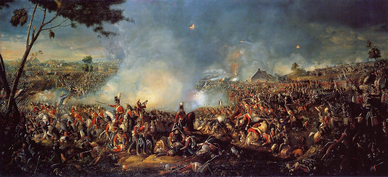 The Battle of Waterloo, by William Sadler II (public domain)
The Battle of Waterloo, by William Sadler II (public domain) More correctly known as the "Additional Act to the Constitutions of the Empire" the document extensively amended (in fact virtually replacing) the previous Napoleonic Constitutions (Constitution of the Year VIII, Constitution of the Year X and Constitution of the Year XII). The Additional Act reframed the Napoleonic constitution into something more along the lines of the Bourbon Restoration Charter of 1814 of Louis XVIII, while otherwise ignoring the Bourbon charter's existence. It was very liberal in spirit, and gave the French people rights which had previously been unknown to them, such as the right to elect the mayor in communes of less than 5,000 in population. Napoleon treated it as a mere continuation of the previous constitutions, and it therefore took the form of an ordinary legislative act "additional to the constitutions of the Empire."
The legislative power was to be exercised by the Emperor together with the Parliament, which was to be composed of two chambers: the Chamber of Peers composed of hereditary members appointed by the Emperor, and the Chamber of Representatives, composed of 629 citizens elected for 5 year terms by electoral colleges in the individual départments. The ministers were to be responsible to the Parliament for their actions. The liberalization dealt both with the guarantees of rights and the end of censorship.
Despite these liberal reforms, however, Napoleon was, in effect, an absolute monarch with respect to national foreign and war policy. Unable to negotiate a settlement with his former enemies to recognize his rule, he raised an army of over 200,000 - mostly veterans of his former campaigns -- and sought to inflict a decisive victory against the Anglo-Dutch and Prussian armies in order to secure his position within France. At the Battle of Waterloo, Napoleon was defeated and forced to retreat into France and sue for peace, which was offered only on condition of his second abdication.
In the subsequent second restoration of the Bourbon monarchy, the people, through their representatives, attempted to assert the freedoms guaranteed by the Constitution of 1815. Although the monarchy made some concessions, the punitive reparations required by the Second Treaty of Paris and other factors required the King to impose onerous taxes.
The ascension of Charles X to the throne in 1824 saw a return to near absolute power for the monarch, resulting in the Revolutions of 1830 and 1848. Yet in 1851, Louis Napoleon, president of the Second Republic, staged a coup and declared himself to be Emperor as Napoleon III, reigning until 1870, Despite adopting liberal policies internally, as his uncle had done during 100 days, Napoleon III made the same error has had Napoleon I in assuming that he could exercise absolute control over foreign and war policy. His defeat in the Franco-Prussian War would likewise lead to his downfall as the defeat had Waterloo had done for Napoleon I.
 RSS Feed
RSS Feed